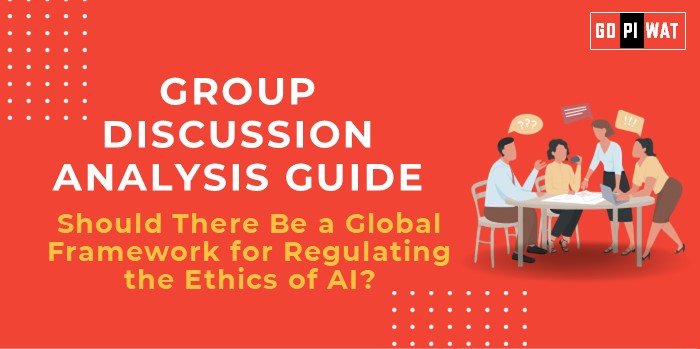📋 Group Discussion (GD) Analysis Guide: Should There Be a Global Framework for Regulating the Ethics of AI?
🌐 Introduction to the Topic
- 🔍 Opening Context: Artificial intelligence (AI) is revolutionizing industries globally, raising critical ethical questions about its use and potential misuse. The need for a global framework for AI ethics has become pressing as AI transcends borders, affecting economies, societies, and individual freedoms.
- 📖 Topic Background: The idea of a unified ethical framework for AI stems from increasing concerns about bias, privacy, and decision-making autonomy in AI applications. In 2021, UNESCO adopted the first global AI ethics recommendation, signifying a step towards international consensus, but enforcement remains fragmented.
📊 Quick Facts and Key Statistics
– 🌍 AI Market Value (2024): $207 billion – Reflects AI’s rapid adoption across industries.
– 📜 Global AI Policy Adoption: 60+ countries have national AI strategies – Highlights the uneven regulatory landscape.
– ⚠️ Algorithmic Bias Cases: Over 70 documented instances (2023) – Showcases risks of unregulated AI.
– 🌐 UNESCO AI Ethics Recommendation (2021): First globally recognized framework – Yet implementation is voluntary.
– 📜 Global AI Policy Adoption: 60+ countries have national AI strategies – Highlights the uneven regulatory landscape.
– ⚠️ Algorithmic Bias Cases: Over 70 documented instances (2023) – Showcases risks of unregulated AI.
– 🌐 UNESCO AI Ethics Recommendation (2021): First globally recognized framework – Yet implementation is voluntary.
🤝 Stakeholders and Their Roles
- ⚖️ Governments: Draft and enforce national AI regulations; influence global cooperation.
- 💻 Tech Companies: Drive AI innovation; implement ethical standards in development.
- 🌍 International Organizations (e.g., UNESCO, OECD): Facilitate global dialogue and set ethical benchmarks.
- 📢 Civil Society: Advocate for fairness, transparency, and accountability in AI use.
🏆 Achievements and Challenges
✨ Achievements:
- 🌐 Global Cooperation Beginnings: UNESCO’s 2021 ethics recommendation brought 193 nations to consensus.
- 🔍 AI Bias Detection Tools: Companies like IBM and Google have developed bias-detection frameworks.
- ❤️ AI for Social Good: Projects like AI-based disease prediction models have transformed healthcare in developing nations.
⚠️ Challenges:
- 📜 Fragmented Regulation: Varied AI laws across nations hinder a cohesive global standard.
- 🔒 Lack of Enforcement Mechanisms: Global frameworks often lack binding authority.
- 🌍 Tech Competition: Nations prioritize AI dominance over ethical cooperation.
🌎 Global Comparisons: The EU’s AI Act (2021) provides comprehensive, binding ethical AI guidelines, while China’s focus on surveillance raises global privacy concerns.
📌 Case Studies:
– Cambridge Analytica Scandal (2018): Exemplifies the misuse of AI in influencing democratic processes.
– EU’s GDPR Impact: Demonstrates a successful regional framework influencing global data protection standards.
🧠 Structured Arguments for Discussion
- ✅ Supporting Stance: “A global framework ensures consistent ethical AI practices, safeguarding against bias and misuse.”
- ❌ Opposing Stance: “National priorities and sovereignty make a universal framework impractical.”
- ⚖️ Balanced Perspective: “While challenging, a global framework can coexist with regional adaptations to ensure ethical AI.”
🎯 Effective Discussion Approaches
- 📜 Opening Approaches:
- 📈 Statistical Impact: “AI is expected to contribute $15.7 trillion to the global economy by 2030, but at what ethical cost?”
- ⚖️ Contrast: “AI innovations outpace ethical guidelines, leaving critical gaps in oversight.”
- 📌 Case Study: “The Cambridge Analytica scandal demonstrates the need for international cooperation in AI ethics.”
- 🔍 Counter-Argument Handling:
- Acknowledge sovereignty concerns but highlight global interoperability.
- Use successful examples like GDPR to show benefits of international standards.
🔍 Strategic Analysis: Strengths, Weaknesses, Opportunities, Threats
- 💪 Strengths: AI’s transformative potential, existing global cooperation (e.g., UNESCO).
- ⚠️ Weaknesses: Regulatory disparities, enforcement challenges.
- 🚀 Opportunities: Ethical AI innovation, fostering global trust.
- ⚡ Threats: Tech misuse, geopolitical tensions.
🎓 Connecting with B-School Applications
- 🌟 Real-World Applications: AI ethics frameworks can inspire projects in responsible innovation, international law, and tech strategy.
- ❓ Sample Questions:
- “How can businesses integrate global AI ethics frameworks into operations?”
- “What lessons can the AI industry learn from GDPR’s success?”
- 💡 Insights for Students: Understanding global AI ethics can shape future leadership in tech-driven industries.


